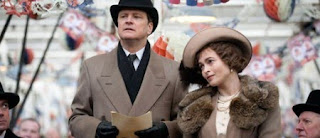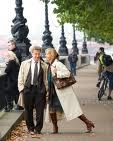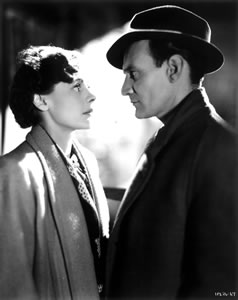Like a fine wine, actor Ian McShane continues to age beautifully, stepping into the limelight at intervals in order to remind us just how delicious he is – especially when playing the bad boy. Villianous roles, it seems, suit McShane right down to the ground and at age sixty-eight, they keep coming his way.
Born in Blackburn, England, McShane is the son of professional soccer player Harry McShane, who played for Manchester United, and Irene McShane. He attended the Royal Academy of Dramatic Arts. Having starred in more than thirty films, McShane made his debut in 1962’s The Wild and the Willing that led to other roles in The Battle of Britain, The Last of Sheila (at right), Villain (co-starring Richard Burton), Exposed, and Agent Cody Banks.
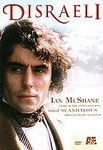
His TV resumé includes any number of TV-movies and miniseries: he played Judas in the internationally produced
Jesus of Nazareth (1977) and was seen as the title character in the British miniseries
Disraeli (1979). In America, he was a regular on the 1989-90 season of
Dallas, playing Don Lockwood.
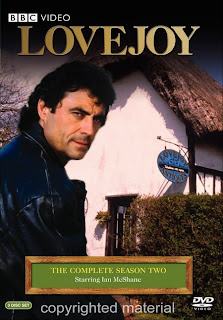
McShane gained an international fan following as a result of his starring role in the widely-distributed TV series The Lovejoy Mysteries, originally filmed in 1986, then brought back by popular demand in 1990. In the late 80’s the actor formed McShane Productions, which produced the much-adored Lovejoy for the BBC and A&E. The series, based on the books by Jonathan Gash, features antique dealer/detective Lovejoy, a “divvie” who has an uncanny ability to recognise exceptional items as well as for distinguishing fakes or forgeries from genuine antiques.

McShane earned the coveted Golden Globe Award for “Best Actor in a Television Drama” for his versatile performance as Al Swearengen on HBO’s hit series Deadwood. His charismatic portrayal of Swearengen also led him to a nomination for the 2005 Emmy and a 2005 and 2006 SAG nomination for Lead Actor, as well as being voted by People Magazine in 2005, “TV’s Sexiest Villain.” McShane’s performance gained him a wave of critical acclaim which earned him the Television Critics Association’s annual award for “Individual Achievement in Drama,” and being selected as one of GQ’s “Men of the Year.” They described the character of Swearengen as “infectious” and “darkly irresistible.” The New York Times dubbed him as “One of the Most Interesting Villains on Television,” and Rolling Stone Magazine bestowed the title of “Hot Barkeep” and described the character as “played to perfection.”
McShane has also voiced several characters for films – Captain Hook in Shrek the Third and the voice of Mr. Bobinski, in the film Coraline and has had a long stage career. In 2000 McShane returned to the West End in London to make his musical debut starring in Cameron Mackintosh’s successful musical The Witches of Eastwick as Darryl Van Horne. His varied stage career has included roles as Hal in the original cast of Loot, the title role of The Admirable C
richton at the Chichester Festival, Tom in The Glass Menagerie, and Charlie in The Big Knife. He co-starred with Judi Dench and Ian McKellen in Promise, which successfully played London and debuted on Broadway. In Los Angeles he starred in three productions at The Matrix Theatre, including the world premiere of Larry Atlas’ Yield of the Long Bond and two others for which he received the Los Angeles Drama Critics’ Circle Award, Inadmissible Evidence and Betrayal.
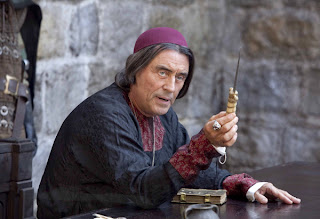
A current villainous role is his appearance as the crafty bishop of Shiring, Waleran Bigod, in the TV production of Ken Follett’s novel Pillars of the Earth. He is duplicious, a liar, and changes sides in the war between Stephen and Maud with alacrity. But you can’t help admiring his acting!
Ian McShane plays the fearsome pirate Blackbeard in
Pirates of the Caribbean: On Stranger Tides, the fourth installment of the Disney movie series directed by Rob Marshall scheduled to open May 20, 2011. McShane will play legendary pirate–real name was Edward Teach– who piloted the ship Queen Anne’s Revenge. Read McShane’s latest interview in the Independent
here, in which we learn a few details about his colourful love life, that he likes oysters and that he’s not personally fond of antiques. You can watch an interview with Ian about his upcoming role
here. And another interview about his stage work with Charlie Rose
here. Drink up.


